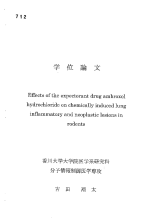Effects of the expectorant drug ambroxol hydrochloride on chemically induced lung inflammatory and neoplastic lesions in rodents
この論文にアクセスする
著者
書誌事項
- タイトル
-
Effects of the expectorant drug ambroxol hydrochloride on chemically induced lung inflammatory and neoplastic lesions in rodents
- 著者名
-
吉田, 翔太
- 学位授与大学
-
香川大学
- 取得学位
-
博士(医学)
- 学位授与番号
-
甲第712号
- 学位授与年月日
-
2019-03-24
注記・抄録
AbstractAmbroxol hydrochloride (AH) is an expectorant drug used to stimulate pulmonary surfactant and serous airway secretion. Surfactant proteins (SPs) are essential for maintaining respiratory structure and function, although SP expression has also been reported in lung inflammatory and proliferative lesions. To determine whether AH exerts modulatory effects on these lung lesions, we examined its effects on pleural thickening induced by intrathoracic administration of dipotassium titanate (TISMO) in A/JJmsSlc (A/J) mice. We also analyzed the modulatory effects of AH on neoplastic lung lesions induced by 4-(methylnitrosamino)-1-(3-pyridyl)-1-butanone (NNK) in A/J mice and by N-nitrosobis (2-hydroxypropyl) amine (DHPN) in F344/DuCrlCrj (F344) rats. A/J mice treated with TISMO showed decreased body weight, increased white blood cell (WBC) counts, and pleural thickening caused by pleuritis and poor general condition. However, A/J mice treated with TISMO + 120 ppm showed significant recovery of body weight and WBC counts to the same levels as those of A/J mice not treated with TISMO, although no significant differences were observed in histopathological changes including the immunohistopathological expression of IL-1β in the lung and maximum pleural thickness regardless of AH treatment. In the NNK and DHPN experiments, no significant differences in body weight, hematology, plasma biochemistry, and histopathological changes were associated with AH concentration. These results suggest that AH potentially exerts anti-inflammatory effects but does not have a direct suppressive effect on lung tumorigenesis in rodents.
Abstract Ambroxol hydrochloride (AH) is an expectorant drug used to stimulate pulmonary surfactant and serous airway secretion. Surfactant proteins (SPs) are essential for maintaining respiratory structure and function, although SP expression has also been reported in lung inflammatory and proliferative lesions. To determine whether AH exerts modulatory effects on these lung lesions, we examined its effects on pleural thickening induced by intrathoracic administration of dipotassium titanate (TISMO) in A/JJmsSlc (A/J) mice. We also analyzed the modulatory effects of AH on neoplastic lung lesions induced by 4-(methylnitrosamino)-1-(3-pyridyl)-1-butanone (NNK) in A/J mice and by N-nitrosobis (2-hydroxypropyl) amine (DHPN) in F344/DuCrlCrj (F344) rats. A/J mice treated with TISMO showed decreased body weight, increased white blood cell (WBC) counts, and pleural thickening caused by pleuritis and poor general condition. However, A/J mice treated with TISMO + 120 ppm showed significant recovery of body weight and WBC counts to the same levels as those of A/J mice not treated with TISMO, although no significant differences were observed in histopathological changes including the immunohistopathological expression of IL-1β in the lung and maximum pleural thickness regardless of AH treatment. In the NNK and DHPN experiments, no significant differences in body weight, hematology, plasma biochemistry, and histopathological changes were associated with AH concentration. These results suggest that AH potentially exerts anti-inflammatory effects but does not have a direct suppressive effect on lung tumorigenesis in rodents.
